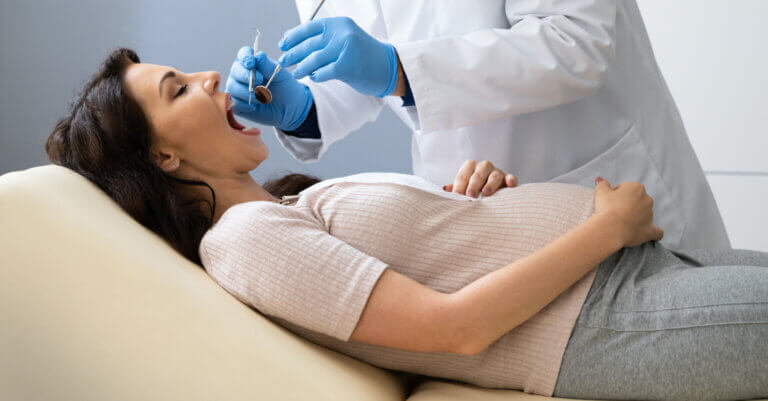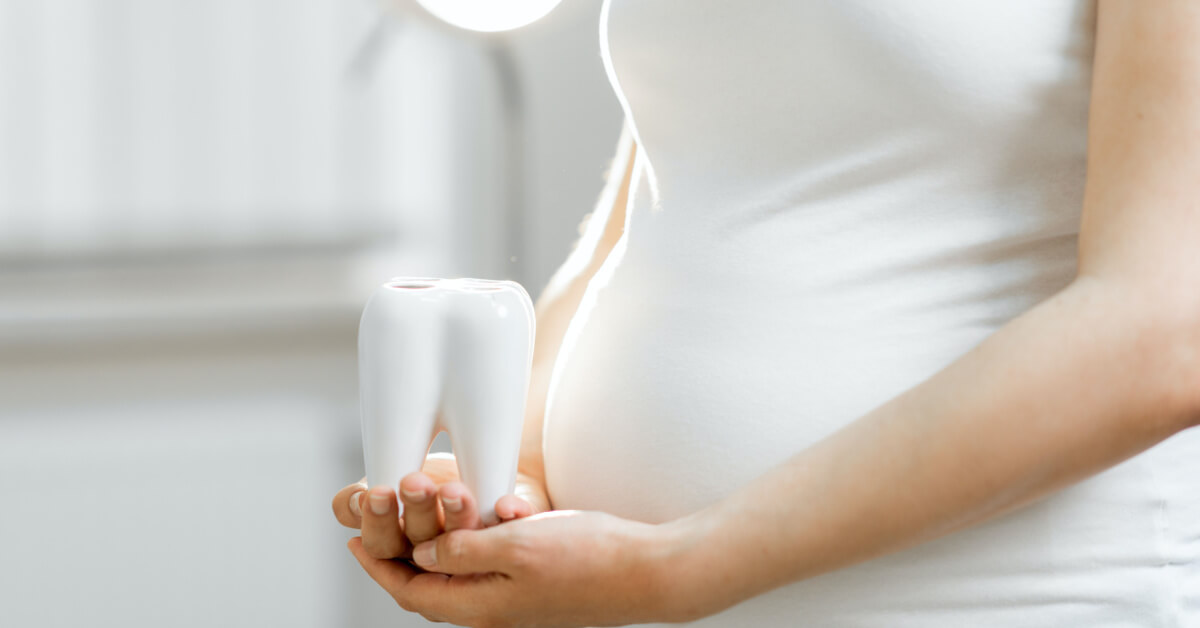Is Wisdom Tooth Extraction During Pregnancy Safe?

Oral health is a fundamental part of everyone’s overall well-being. However, due to popular beliefs, many moms during pregnancy are afraid to go to the dentist to have their wisdom teeth removed. The removal of third molars is a common dental operation but, during pregnancy, doubts, and concerns about their safety arise.
In this article, we’ll explain whether this procedure can have consequences for pregnant women or their babies. This way, you can make informed decisions to avoid dental infections that endanger the health of mothers and developing fetuses.
You might be interested in: Are There Natural Remedies for Whitening Teeth During Pregnancy?
The importance of oral health during pregnancy
There are many myths surrounding dental care in pregnancy. This means that many pregnant moms don’t receive timely dental care in comparison to women who aren’t pregnant. So, if you’re expecting, it’s important to get as much information as possible before having your wisdom teeth removed and have the extraction done in a specialized place.
A study in the journal BMC Pregnancy and Childbirth suggested that dental care is of great importance during pregnancy. This is because mothers experience hormonal and physical changes that often favor the development of cavities and gingival problems that, if left untreated, can lead to premature births, preeclampsia, gingival tissue ulcerations, and dental erosions.
Because of the above, it’s essential that pregnant women make regular visits to the dentist and maintain good oral hygiene at home. In addition, it’s important to inform dentists about the pregnancy and any changes in oral health so that they can adapt treatments and procedures as needed.
Is it safe to remove wisdom teeth during pregnancy?

When third molars don’t erupt properly, they often cause intense pain, gum inflammation, dental infections, and impacts on the surrounding teeth of expectant mothers. These discomforts can be very difficult to cope with in addition to the typical discomforts of pregnancy.
Fortunately, research published in the Journal of the Turkish German Gynecological Association reported that, with the approval of the pregnant woman’s physician, many dental treatments can be performed safely on women. Among such procedures are wisdom tooth extractions with local anesthetics such as lidocaine.
At the same time, this study suggested that the most advisable period to carry out dental removals in pregnant women is in the second trimester of pregnancy. This is because the first three months represent the stage of organogenesis and unnecessary interventions can lead to miscarriages.
It’s noteworthy that some research has reported that when pregnant women must have an X-ray (in this case dental X-ray), ionizing radiation can be reduced with lead gowns, fast films, and well-calibrated instruments. The amount of radiation should never exceed 0.20 Gy, as higher doses can cause microcephaly and mental impairment in infants.

Tips for taking care of oral health and wisdom teeth in pregnancy
There are several recommendations that pregnant women can follow to take care of their teeth during pregnancy. But remember that each pregnancy is unique and open and constant communication with your dentist and gynecologist is essential in order to receive proper and personalized dental care during this special stage of your life.
Here are some helpful suggestions.
- Maintain good oral hygiene: Brush your teeth at least twice a day with fluoride toothpaste and floss after every meal. This will help prevent the accumulation of bacterial plaque and the onset of periodontal disease.
- Make regular dental visits: Schedule regular appointments with your dentist for checkups and professional cleanings. Keep in mind that, according to a study in Community Dentistry and Oral Epidemiology, pregnant moms with periodontitis may have twice the risk of preterm labor.
- Evaluate the need for removal: If your wisdom teeth cause you discomfort and pain, consult with your dentist and gynecologist to evaluate the need to remove them during pregnancy. So, take into consideration the potential risks and individual recommendations.
- Consider the right time: When wisdom tooth extraction is necessary, choose the most suitable time in consultation with your healthcare professionals. As previously mentioned, the second trimester is usually considered the safest period for dental interventions, but this should be evaluated on a case-by-case basis.
Continue reading: Nausea and Vomiting During Pregnancy: How Care for Your Teeth
Wisdom teeth can be removed during pregnancy
In conclusion, removal of third molars during pregnancy may be necessary in some cases, but individual precautions and evaluations must be made to ensure the safety of both mother and fetus. If your wisdom teeth are causing you significant pain or dental problems, it’s important to consult with your dentist and gynecologist to evaluate when the best time is to remove them to prevent possible complications.
Oral health is a fundamental part of everyone’s overall well-being. However, due to popular beliefs, many moms during pregnancy are afraid to go to the dentist to have their wisdom teeth removed. The removal of third molars is a common dental operation but, during pregnancy, doubts, and concerns about their safety arise.
In this article, we’ll explain whether this procedure can have consequences for pregnant women or their babies. This way, you can make informed decisions to avoid dental infections that endanger the health of mothers and developing fetuses.
You might be interested in: Are There Natural Remedies for Whitening Teeth During Pregnancy?
The importance of oral health during pregnancy
There are many myths surrounding dental care in pregnancy. This means that many pregnant moms don’t receive timely dental care in comparison to women who aren’t pregnant. So, if you’re expecting, it’s important to get as much information as possible before having your wisdom teeth removed and have the extraction done in a specialized place.
A study in the journal BMC Pregnancy and Childbirth suggested that dental care is of great importance during pregnancy. This is because mothers experience hormonal and physical changes that often favor the development of cavities and gingival problems that, if left untreated, can lead to premature births, preeclampsia, gingival tissue ulcerations, and dental erosions.
Because of the above, it’s essential that pregnant women make regular visits to the dentist and maintain good oral hygiene at home. In addition, it’s important to inform dentists about the pregnancy and any changes in oral health so that they can adapt treatments and procedures as needed.
Is it safe to remove wisdom teeth during pregnancy?

When third molars don’t erupt properly, they often cause intense pain, gum inflammation, dental infections, and impacts on the surrounding teeth of expectant mothers. These discomforts can be very difficult to cope with in addition to the typical discomforts of pregnancy.
Fortunately, research published in the Journal of the Turkish German Gynecological Association reported that, with the approval of the pregnant woman’s physician, many dental treatments can be performed safely on women. Among such procedures are wisdom tooth extractions with local anesthetics such as lidocaine.
At the same time, this study suggested that the most advisable period to carry out dental removals in pregnant women is in the second trimester of pregnancy. This is because the first three months represent the stage of organogenesis and unnecessary interventions can lead to miscarriages.
It’s noteworthy that some research has reported that when pregnant women must have an X-ray (in this case dental X-ray), ionizing radiation can be reduced with lead gowns, fast films, and well-calibrated instruments. The amount of radiation should never exceed 0.20 Gy, as higher doses can cause microcephaly and mental impairment in infants.

Tips for taking care of oral health and wisdom teeth in pregnancy
There are several recommendations that pregnant women can follow to take care of their teeth during pregnancy. But remember that each pregnancy is unique and open and constant communication with your dentist and gynecologist is essential in order to receive proper and personalized dental care during this special stage of your life.
Here are some helpful suggestions.
- Maintain good oral hygiene: Brush your teeth at least twice a day with fluoride toothpaste and floss after every meal. This will help prevent the accumulation of bacterial plaque and the onset of periodontal disease.
- Make regular dental visits: Schedule regular appointments with your dentist for checkups and professional cleanings. Keep in mind that, according to a study in Community Dentistry and Oral Epidemiology, pregnant moms with periodontitis may have twice the risk of preterm labor.
- Evaluate the need for removal: If your wisdom teeth cause you discomfort and pain, consult with your dentist and gynecologist to evaluate the need to remove them during pregnancy. So, take into consideration the potential risks and individual recommendations.
- Consider the right time: When wisdom tooth extraction is necessary, choose the most suitable time in consultation with your healthcare professionals. As previously mentioned, the second trimester is usually considered the safest period for dental interventions, but this should be evaluated on a case-by-case basis.
Continue reading: Nausea and Vomiting During Pregnancy: How Care for Your Teeth
Wisdom teeth can be removed during pregnancy
In conclusion, removal of third molars during pregnancy may be necessary in some cases, but individual precautions and evaluations must be made to ensure the safety of both mother and fetus. If your wisdom teeth are causing you significant pain or dental problems, it’s important to consult with your dentist and gynecologist to evaluate when the best time is to remove them to prevent possible complications.
All cited sources were thoroughly reviewed by our team to ensure their quality, reliability, currency, and validity. The bibliography of this article was considered reliable and of academic or scientific accuracy.
- Bahramian, H., Mohebbi, S. Z., Khami, M. R., & Quinonez, R. B. (2018). Qualitative exploration of barriers and facilitators of dental service utilization of pregnant women: A triangulation approach. BMC pregnancy and childbirth, 18(1), 1-11. Retrieved from: https://www.ncbi.nlm.nih.gov/pmc/articles/PMC5946421/
- Kumar R, De Jesus O. (2023). Radiation Effects On The Fetus. StatPearls. Retrieved from: https://www.ncbi.nlm.nih.gov/books/NBK564358/
- Manrique, E. J., Orozco, D., López, A., Quesada, J. A., Gil, V. F., & Carratala, C. (2019). Maternal periodontitis and preterm birth: Systematic review and meta-analysis. Community dentistry and oral epidemiology, 47(3), 243-251. Retrieved from: https://onlinelibrary.wiley.com/doi/abs/10.1111/cdoe.12450
- Yenen, Z., & Ataçağ, T. (2019). Oral care in pregnancy. Journal of the Turkish German Gynecological Association, 20(4), 264. Retrieved from: https://www.ncbi.nlm.nih.gov/pmc/articles/PMC6883753/
This text is provided for informational purposes only and does not replace consultation with a professional. If in doubt, consult your specialist.








